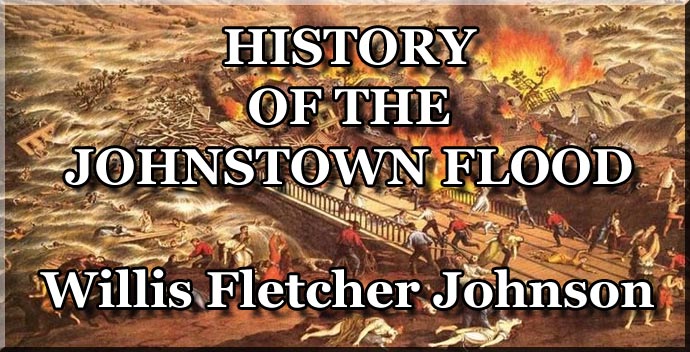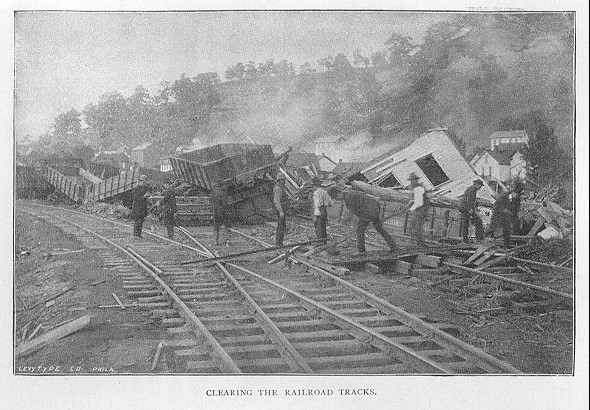
History of the Johnstown Flood
By Willis Fletcher Johnson
Chapter 44
|
ADJUTANT-GENERAL D. H. HASTINGS remained in charge at Johnstown for over a month, executing his arduous labors faithfully and well. It was a trying task. The actual amount of work done was enormous. He was surrounded constantly by scenes of suffering, distressful, heartrending. People impatient in their woe clamored against him. He had to exercise energy, tact, discretion, authority, severity, tenderness, all at once. It was a great task, nobly performed; but, doubtless gladly laid down when the end came. The farewell-saying time came on July 8th. That night immediately after supper, Colonel Perchment marched the members of the Fourteenth Regiment over the river, and halted them in front of General Hastings' headquarters. About two hundred of the townspeople gathered on the outside of the lines formed by the soldiers, all waiting to see what the gathering meant. All the heads of departments about the headquarters were assembled in front of the tents, and Mr. Cyrus Elder, Colonel John P. Linton, Captain Kuhn, and other prominent men of Johnstown were present. Everybody was waiting for General Hastings. He came out of his tent with Department Commander Stewart, and took a stand on the outer edge of the crowd. Commander Stewart called the crowd to order, and Colonel Frank B. Eshleman explained to General Hastings the meaning of the gathering. He said that Colonel Perchment and his command had come to acknowledge the many courtesies and kindnesses they had received from General Hastings during the five weeks they had been on duty there. While some of the orders from headquarters may have seemed severe at the time they were given, the men now recognized that every order had been for the welfare of the whole people. Then turning to General Wiley, Colonel Eshleman said that the regiment also desired to return its thanks to him for the many kindnesses received from him. He spoke of General Wiley's arduous duties, and said that it was his wise direction of the department of public safety that had prevented riots and had protected the property of the people. General Hastings, in replying, paid a glowing tribute to Colonel Perchment and the men in his command. He said that the services rendered by the Fourteenth Regiment reflected credit upon the city from which they came, reflected credit upon the county of Allegheny, and upon the National Guard of the State. Every man had reason to feel proud of the record he had made individually, and of the record of the regiment as a whole. General Hastings was about to return to his headquarters when he was stopped by Colonel Stewart, who said he wanted to see him for a few minutes. In an eloquent address Colonel Stewart then presented to General Hastings a handsome diamond and gold badge from the Department of the Grand Army of the Republic. In his speech Colonel Stewart paid the most flowing compliments to General Hastings for the ability he had displayed in the work of clearing the debris from the Conemaugh Valley, and relieving the suffering of the people. The badge is a beautiful emblem. The base is a facsimile of the shoulder-strap of a brigadier-general, with stars set in diamonds; pendant from the bar is the monogram “N. G. P.,” entirely of diamonds. The main badge below is a keystone of dead and bright gold, surmounted by an enameled circle, on which is engraved: “From the Department of Pennsylvania of the G.A.R.” On the reverse side is the inscription: “To Adjutant-General D. H. Hastings for many favors and earnest help to the grand Army of the Republic. In his response General Hastings said: “Colonel Stewart, I cannot find words to express the gratitude I feel to the old soldiers who are here and whom you represent, for this most unmerited compliment. I want to assure you that I am entitled to no such compliment as you have bestowed upon me. I want to say to you that I would not have one of my hearers go away from here with any other thought in his mind than that I only wanted to do my duty to my fellow-men in this stricken region. The Grand Army of the Republic, as an organization, and many of them as individuals, have been very kind to me, and if I have, by official action or otherwise, been enabled to instill in the minds of the youth of this commonwealth a soldierly spirit, a patriotic love of country, which I hope I have, I have only been able to point to the example that has been set to the people of this State and nation by the boys who wore the blue. When I had an opportunity to cross this river for the first time, and go down into the heart of the town, there I found your able commander with his coat off busy at work distributing clothing, comfort, and consolation and kind words to the bereaved ones whose parents had followed with him the flag of the country. By his side were gathered some of the men who are gathered with him here tonight” Mr. Cyrus Elder and Colonel John P. Linton spoke for the citizens. Mr. Elder said that the Citizens' Committee had, at its meeting that day, adopted this resolution: “General D. H. Hastings having advised the Finance Committee that other official duties will oblige him to leave Johnstown to-morrow, we desire to put upon our records, in an informal way, our high appreciation of his services to this suffering community. Coming to us in the earliest and worst days of our distress, he made himself one with us, he voluntarily partook of the hardships which we endured, and he has devoted himself unreservedly to the work of making the remnant of our ruined city habitable, and of comforting, strengthening, and encouraging the helpless people. We shall not attempt any commendation of his great labors, or try to say how thoughtful he has been for us, how wise, and how kind. It is best stated in saying the he has endeared himself to all our people, who will join us in saying, 'God bless him.'” General Hastings and Colonel J. L. Spangler returned to their homes at Bellefonte, Pa., on July 10th. That their townsmen were glad to welcome them back was evidenced by the monster public reception given to them in Bush's Arcade Hall amid cheers and band music. Mr. George C. Potts, a prominent iron ore operator, was made President. Mr. E. C. Humes, President of the First National Bank, delivered the address of welcome to the distinguished guests. Mr. Humes made a spirited address. General Hastings was loudly called for. The General was pretty well exhausted physically, but responded as follows: “MR. CHAIRMAN AND NEIGHBORS: I thank you more than I can find words to express for this most unmerited compliment. It has always been my ambition to merit the approval and good-will and kindly feeling of my neighbors and fellow-townsmen. If we have done anything within the past few weeks that merits your approval, I am duly thankful, and it shall always be my ambition to merit the good-will of my neighbors in Bellefonte. I will have to ask you to excuse me from making any extended remarks at this time, and for this compliment paid me this evening I thank you from the bottom of my heart. My friend, Colonel Spangler, who was with me all through the troubles, is here, and he can make more extended remarks of our labors there.” Colonel Spangler was next called upon, and responded with a very interesting but brief review of their work at Johnstown. He said: “MR. CHAIRMAN, FRIENDS, AND NEIGHBORS: I am placed in a somewhat peculiar situation at this time. I appreciate very kindly what our good friend, Mr. Humes, has said, that perhaps some of you would like to know about our operations while at Johnstown, yet just where to begin, what to say, and how to say it is very a difficult thing to decide. I appreciate the compliment you paid us by turning out this very warm evening to welcome us back to our homes.
“It so happened that both of us were in Cambria County on the Friday of the disaster. It was raining that day, and was very muddy. Both of us were out that day in the rain and mud with gum boots and rubber coats, and turned in for the night tired, wet and sore. The next morning, at six o'clock the landlord at whose house we stopped came up to General Hastings's door, and said there had been a flood at Johnstown, and five hundred people were drowned. He then came to my door, rapped, and made the same announcement. We immediately got up, and were eating our breakfast when the second message came over the telephone, stating that the loss was a thousand. “General Hastings then said, if that was the case, there would be a great many homeless people in that valley, and he asked me to accompany him to Johnstown, and ascertain the truth of these reports, and, if true, he would telegraph at once to Harrisburg for tents. We then drove to Ebensburg, fifteen miles, and after arriving there we learned that five thousand people had perished by the flood. We did not credit it. We started to go to Bellefonte, our home, by the way of Johnstown. After we were about seven miles out from Ebensburg we met a number of ladies and gentlemen, who seemed to be wandering about in the woods, some walking, some in wagons, some with lumber teams, some on horseback, but most were walking. They seemed to be wandering alone in a bewildered and dazed condition. They didn't know us; we didn't know them. They wouldn't stop and speak to us; we could get no information from them. We at last met a brakeman who knew General Hastings. He stopped, and we asked him what the extent of loss was, and how to reach Johnstown. He told us. The General at once sent with him a telegram to Harrisburg for a thousand tents, and we proceeded on to Johnstown. In conclusion, I want to say that I am sincerely thankful for this compliment paid us, but before I close I desire to say this, that we did the best we could under the circumstances, and further—and yet, I dislike to say it in his presence—that you have a bigger man in Dan Hastings than you ever suspected.”
|
|
 |
 |
|
|
|
-
Site Navigation
 Home
Home What's New
What's New Bible
Bible Photos
Photos Hiking
Hiking E-Books
E-Books Genealogy
Genealogy Profile
Free Plug-ins You May Need
Profile
Free Plug-ins You May Need
 Get Java
Get Java.png) Get Flash
Get Flash Get 7-Zip
Get 7-Zip Get Acrobat Reader
Get Acrobat Reader Get TheWORD
Get TheWORD
